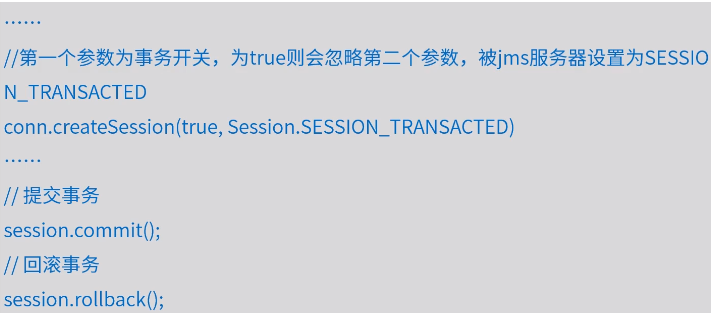一、概述
Apache出品,最流行的,能力强劲的开源消息总线。

1.JMS规范
Java消息服务(Java Message Service,即JMS)应用程序接口是一个Java平台中关于面向消息中间件(MOM)的API,用于应用程序之间,或分布式系统中发送消息,进行异步通信。Java消息服务是一个与具体平台无关的API。
JMS的对象模型
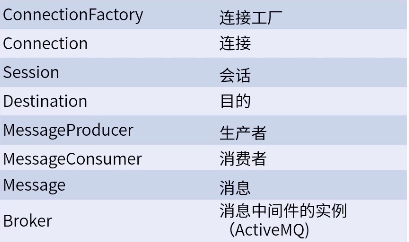
JMS的消息模型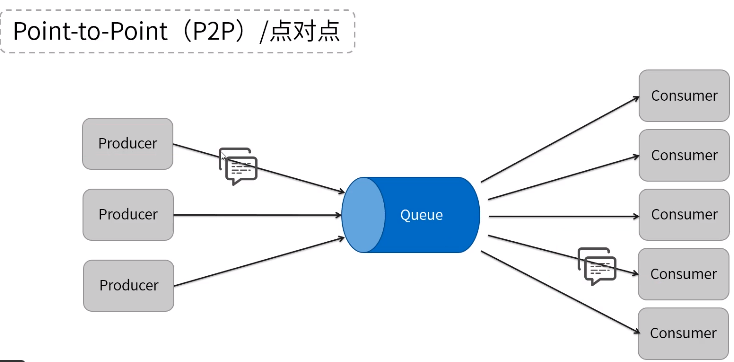
指定的数据给指定的消费者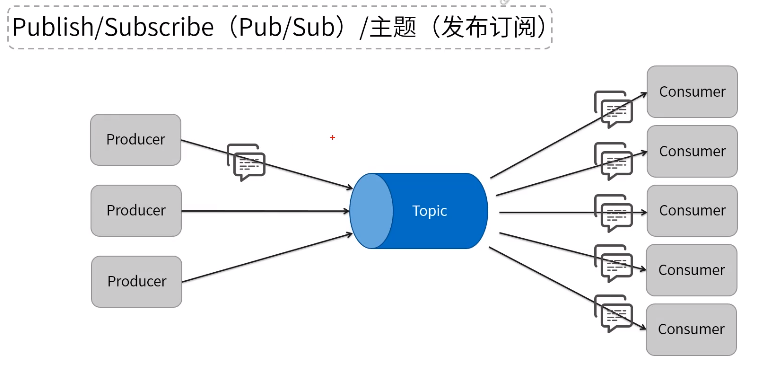
生产者发布消息,消息会传送给所有同一主题的消费者
JMS消息结构

消息头,关于一些消息的描述信息
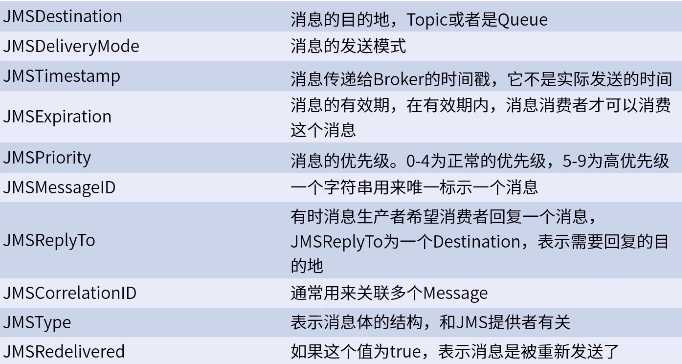
消息属性可以理解为消息的附加消息头,属性名可以自定义
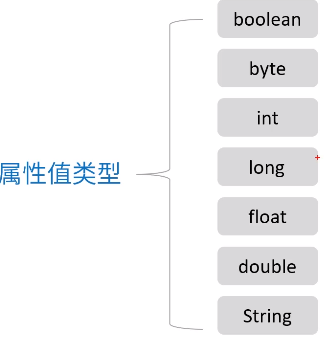
消息体类型

2.ActiveMQ的特性
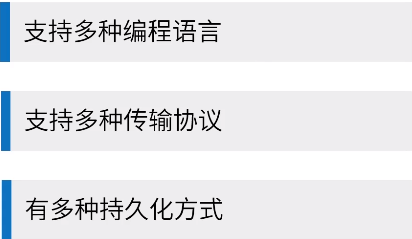
3.安装和启动
centos7
下载 解压 文件夹改名activemq
放在了/var下面
启动
作为后台进程启动
[root@node01 activemq]# ./bin/activemq start INFO: Loading '/bigdata/activemq//bin/env' INFO: Using java '/usr/local/jdk/bin/java' INFO: Starting - inspect logfiles specified in logging.properties and log4j.properties to get details INFO: pidfile created : '/bigdata/activemq//data/activemq.pid' (pid '4203')
停止 则用stop
最好的方式是将ActiveMQ作为服务启动,使用system服务将可以确保ActiveMQ能在系统启动时自动启动。
使用vim创建已给systemd服务文件
vi /usr/lib/systemd/system/activemq.service
填写内容
1 [Unit] 2 Description=ActiveMQ service 3 After=network.target 4 5 [Service] 6 Type=forking 7 ExecStart=/var/activemq/bin/activemq start 8 ExecStop=/var/activemq/bin/activemq stop 9 User=root 10 Group=root 11 Restart=always 12 RestartSec=9 13 StandardOutput=syslog 14 StandardError=syslog 15 SyslogIdentifier=activemq 16 17 [Install] 18 WantedBy=multi-user.target
3.修改/var/activemq/bin/env配置,最下面;将JAVA_HOME的注释取消,填入jdk安装路径
# Location of the java installation # Specify the location of your java installation using JAVA_HOME, or specify the # path to the "java" binary using JAVACMD # (set JAVACMD to "auto" for automatic detection) JAVA_HOME="/bigdata/jdk1.8.0_151" JAVACMD="auto"
启动ActiveMQ服务
systemtcl start activemq
查看服务状态
systemctl status activemq
设置开机启动
ln -s /usr/lib/systemd/system/activemq.service/etc/systemd/system/multi-user.target.wants/activemq.service systemctl enable activemq
防火墙添加ActiveMQ的端口
ActiveMQ启动后,外部还无法访问,还需要在防火墙配置中增加ActiveMQ的Web管理端口和通讯端口。

使用ActiveMQ的Web管理平台
ActiveMQ自带有管理平台,在浏览器访问http://服务IP:8161/admin即可进入
默认开启了身份校验
账户:admin
密码:admin
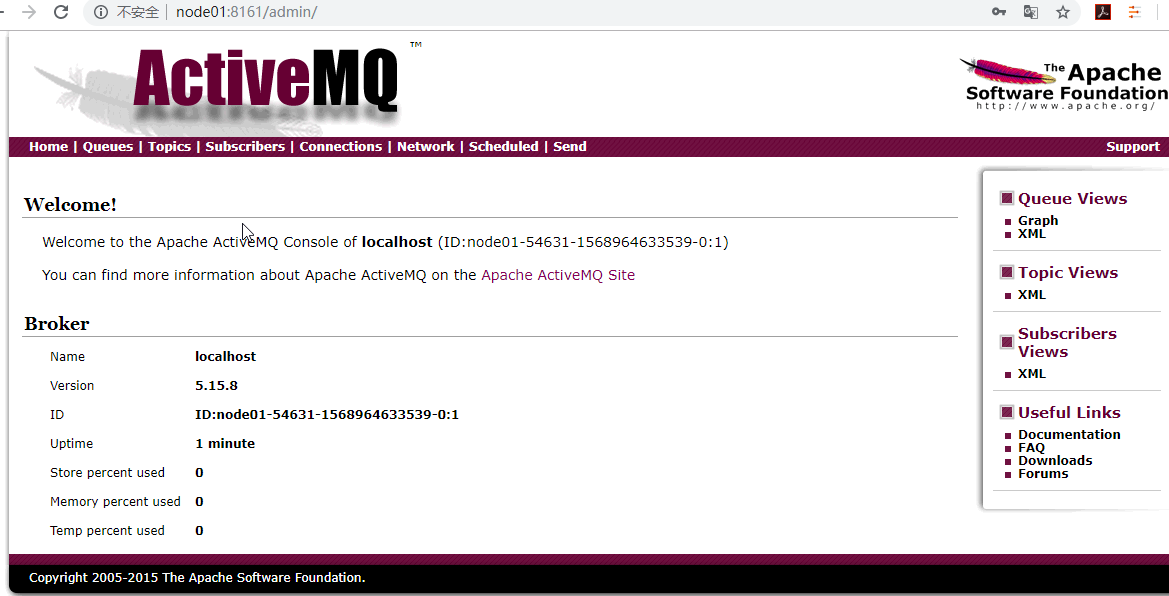
ActiveMQ的Web管理平台是基于jetty运行,因此在/var/activemq/conf目录可以看到jetty的配置文件
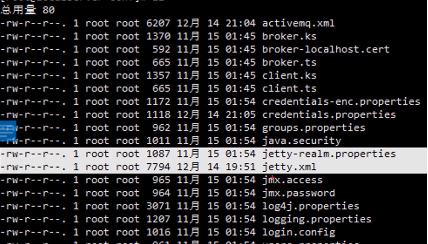
修改web管理平台的默认端口,在/var/activemq/conf/jetty.xml中

密码等
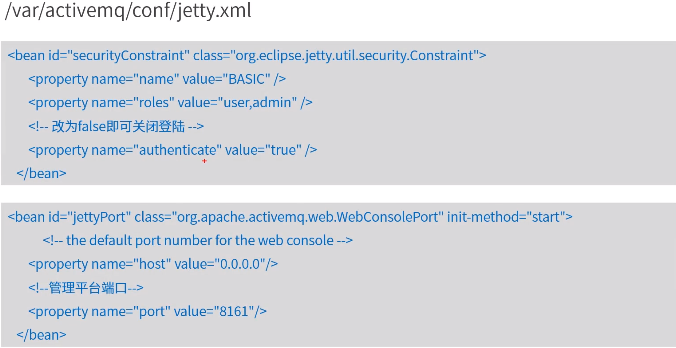

在Java中使用
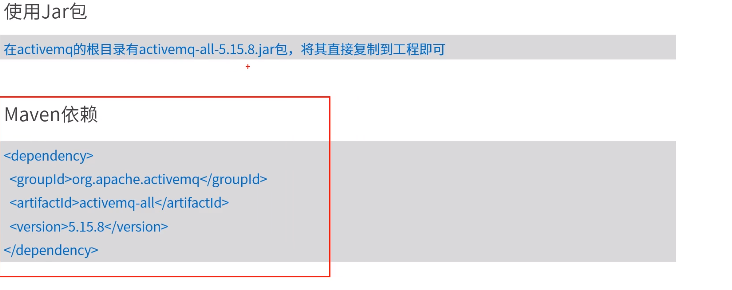
在Spring中使用

/** * 生产者事务 * * 生产者开启事务后,消息发送后,提交事务后,broker上的消息才能发到消费者 */ public class Producer { public static void main(String[] args) { ActiveMQConnectionFactory connectionFactory; Connection conn = null; Session session = null; try { // 1、创建连接工厂 // connectionFactory = new ActiveMQConnectionFactory("admin", "admin", "udp://vm1.tony.com:61616"); connectionFactory = new ActiveMQConnectionFactory("admin", "admin", "tcp://192.168.99.151:61616"); // 2、创建连接对象 conn = connectionFactory.createConnection(); conn.start(); // 3、创建会话 // 第一个参数:是否支持事务,如果为true,则会忽略第二个参数,被jms服务器设置为SESSION_TRANSACTED // 第一个参数为false时,第二个参数的值可为Session.AUTO_ACKNOWLEDGE,Session.CLIENT_ACKNOWLEDGE,DUPS_OK_ACKNOWLEDGE其中一个。 // Session.AUTO_ACKNOWLEDGE为自动确认,客户端发送和接收消息不需要做额外的工作。哪怕是接收端发生异常,也会被当作正常发送成功。 // Session.CLIENT_ACKNOWLEDGE为客户端确认。客户端接收到消息后,必须调用javax.jms.Message的acknowledge方法。jms服务器才会当作发送成功,并删除消息。 // DUPS_OK_ACKNOWLEDGE允许副本的确认模式。一旦接收方应用程序的方法调用从处理消息处返回,会话对象就会确认消息的接收;而且允许重复确认。 session = conn.createSession(true, Session.AUTO_ACKNOWLEDGE); // 4、创建点对点发送的目标 Destination destination = session.createQueue("queue2"); // 创建发布的目标 // Destination b4_destination = session.createTopic("topic1"); // 5、创建生产者消息 MessageProducer producer = session.createProducer(destination); // 设置生产者的模式,有两种可选 // DeliveryMode.PERSISTENT 当activemq关闭的时候,队列数据将会被保存 // DeliveryMode.NON_PERSISTENT 当activemq关闭的时候,队列里面的数据将会被清空 producer.setDeliveryMode(DeliveryMode.NON_PERSISTENT); for (int i = 0; i < 10; i++) { // 6、创建一条消息 // 有6中消息类型: // BytesMessage 用来传递字节 // MapMessage 用来传递字节 // ObjectMessage 用来传递序列化对象 // StreamMessage 用来传递文件等 // TextMessage 用来传递字符串 String text = "Hello world! " + i; TextMessage message = session.createTextMessage(text); // 7、发送消息 producer.send(message); if (i % 3 == 0) { // 3的倍数,发送,但回滚 session.rollback(); } else { // 在开启持久化模式时,commit后,会同步到磁盘 // 所以当一个原子步骤中发送大批量消息,不建议每条消息发送后提交,而是批量发送完后一次性提交,以最大限度地减少磁盘同步产生的延迟. session.commit(); } } } catch (JMSException e) { e.printStackTrace(); } finally { if (conn != null) { try { conn.close(); } catch (JMSException e1) { e1.printStackTrace(); } } if (session != null) { try { session.close(); } catch (JMSException e1) { e1.printStackTrace(); } } } } }
启动
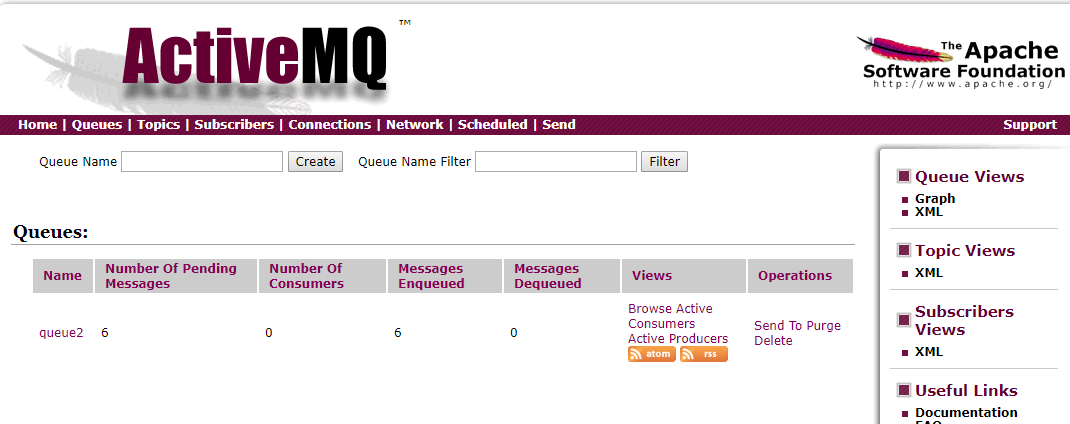
消费者
/** * 消费者事务 * * 消费者开启事务后,接收到消息后,需要手动提交事务,否则broker上的消息不会真正被消费 */ // http://activemq.apache.org/destination-options.html public class Consumer { public static void main(String[] args) { ActiveMQConnectionFactory connectionFactory = null; Connection conn = null; Session session = null; MessageConsumer consumer = null; try { // brokerURL http://activemq.apache.org/connection-configuration-uri.html // 1、创建连接工厂 connectionFactory = new ActiveMQConnectionFactory("tcp://192.168.99.151:61616"); // 2、创建连接对象 conn = connectionFactory.createConnection("admin", "admin"); conn.start(); // 3、创建会话 // 第一个参数:是否支持事务,如果为true,则会忽略第二个参数,被jms服务器设置为SESSION_TRANSACTED // 第一个参数为false时,第二个参数的值可为Session.AUTO_ACKNOWLEDGE,Session.CLIENT_ACKNOWLEDGE,DUPS_OK_ACKNOWLEDGE其中一个。 // Session.AUTO_ACKNOWLEDGE为自动确认,客户端发送和接收消息不需要做额外的工作。哪怕是接收端发生异常,也会被当作正常发送成功。 // Session.CLIENT_ACKNOWLEDGE为客户端确认。客户端接收到消息后,必须调用javax.jms.Message的acknowledge方法。jms服务器才会当作发送成功,并删除消息。 // DUPS_OK_ACKNOWLEDGE允许副本的确认模式。一旦接收方应用程序的方法调用从处理消息处返回,会话对象就会确认消息的接收;而且允许重复确认。 session = conn.createSession(true, Session.AUTO_ACKNOWLEDGE); // 4、创建点对点接收的目标 Destination destination = session.createQueue("queue2"); // 创建订阅的目标 // Destination b4_destination = session.createTopic("topic1"); // 5、创建消费者消息 http://activemq.apache.org/destination-options.html consumer = session.createConsumer(destination); // 6、接收消息 Session finalSession = session; consumer.setMessageListener(new MessageListener() { @Override public void onMessage(Message message) { if (message instanceof TextMessage) { try { System.out.println("收到文本消息:" + ((TextMessage) message).getText()); } catch (JMSException e) { e.printStackTrace(); } } else { System.out.println(message); } try { finalSession.rollback(); } catch (JMSException e) { e.printStackTrace(); } } }); System.in.read(); } catch (JMSException e) { e.printStackTrace(); } catch (IOException e) { e.printStackTrace(); } finally { if (consumer != null) { try { consumer.close(); } catch (JMSException e) { e.printStackTrace(); } } if (session != null) { try { session.close(); } catch (JMSException e1) { e1.printStackTrace(); } } if (conn != null) { try { conn.close(); } catch (JMSException e1) { e1.printStackTrace(); } } } } }
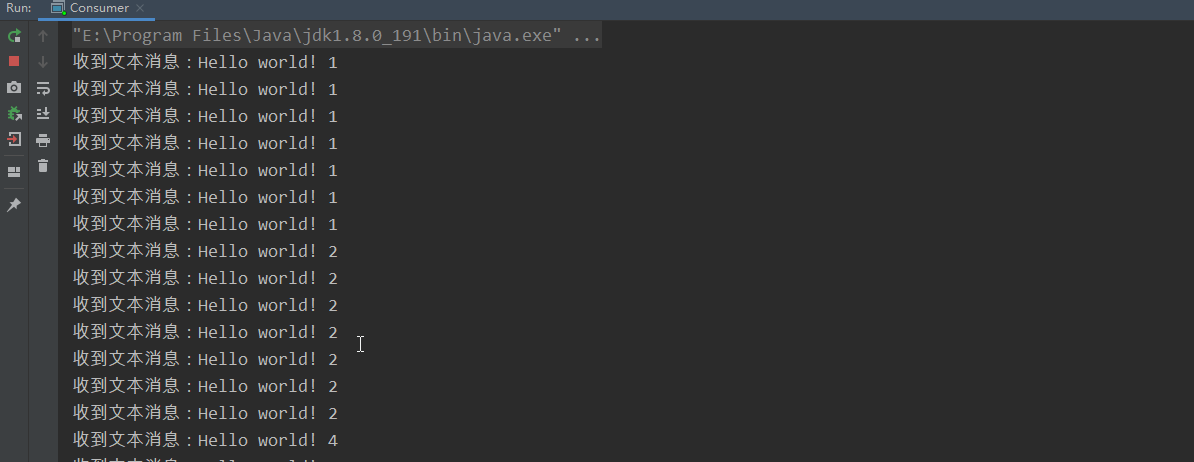
使用spring
pom
<?xml version="1.0" encoding="UTF-8"?> <project xmlns="http://maven.apache.org/POM/4.0.0" xmlns:xsi="http://www.w3.org/2001/XMLSchema-instance" xsi:schemaLocation="http://maven.apache.org/POM/4.0.0 http://maven.apache.org/xsd/maven-4.0.0.xsd"> <modelVersion>4.0.0</modelVersion> <groupId>com.study.mq</groupId> <artifactId>activemq-spring</artifactId> <version>1.0.0</version> <parent> <groupId>org.springframework.boot</groupId> <artifactId>spring-boot-starter-parent</artifactId> <version>2.1.1.RELEASE</version> </parent> <properties> <java.version>1.8</java.version> </properties> <dependencies> <!--直接使用spring-boot-starter-activemq--> <dependency> <groupId>org.springframework.boot</groupId> <artifactId>spring-boot-starter-activemq</artifactId> </dependency> <!-- MQTT --> <dependency> <groupId>org.springframework.integration</groupId> <artifactId>spring-integration-mqtt</artifactId> </dependency> </dependencies> <build> <plugins> <plugin> <groupId>org.springframework.boot</groupId> <artifactId>spring-boot-maven-plugin</artifactId> </plugin> </plugins> </build> </project>
resources文件夹下创建application.properties
spring.activemq.broker-url=tcp://192.168.99.151:61616
spring.activemq.user=admin
spring.activemq.password=admin
package hello; import org.springframework.beans.factory.annotation.Autowired; import org.springframework.boot.SpringApplication; import org.springframework.boot.autoconfigure.SpringBootApplication; import org.springframework.jms.core.JmsTemplate; import javax.annotation.PostConstruct; @SpringBootApplication public class Producer { @Autowired private JmsTemplate jmsTemplate; @PostConstruct public void init() { jmsTemplate.convertAndSend("queue1", "Hello Spring 4"); } public static void main(String[] args) { SpringApplication.run(Producer.class, args); } }
package hello; import org.springframework.boot.SpringApplication; import org.springframework.boot.autoconfigure.SpringBootApplication; import org.springframework.jms.annotation.EnableJms; import org.springframework.jms.annotation.JmsListener; @SpringBootApplication @EnableJms public class Consumer { @JmsListener(destination = "queue1") public void receive(String message) { System.out.println("收到消息:" + message); } public static void main(String[] args) { SpringApplication.run(Consumer.class, args); } }
手工的配置
@Configuration @EnableJms public class JmsConfiguration { /** * 连接工厂 * * @param brokerUrl * @param userName * @param password * @return */ @Bean public ConnectionFactory connectionFactory(@Value("${spring.activemq.broker-url}") String brokerUrl, @Value("${spring.activemq.user}") String userName, @Value("${spring.activemq.password}") String password) { return new ActiveMQConnectionFactory(userName, password, brokerUrl); } /** * 队列模式的监听容器 * * @param connectionFactory * @return */ @Bean public JmsListenerContainerFactory<?> jmsListenerContainerFactoryQueue(ConnectionFactory connectionFactory) { DefaultJmsListenerContainerFactory bean = new DefaultJmsListenerContainerFactory(); bean.setConnectionFactory(connectionFactory); return bean; } /** * topic 监听 * @param connectionFactory * @return */ @Bean public JmsListenerContainerFactory<?> jmsListenerContainerFactoryTopic(ConnectionFactory connectionFactory) { DefaultJmsListenerContainerFactory bean = new DefaultJmsListenerContainerFactory(); bean.setConnectionFactory(connectionFactory); bean.setPubSubDomain(true); return bean; } /** * 队列模板 * * @param connectionFactory * @return */ @Bean public JmsTemplate jmsTemplateQueue(ConnectionFactory connectionFactory) { return new JmsTemplate(connectionFactory); } /** * 发布订阅模板 * * @param connectionFactory * @return */ @Bean public JmsTemplate jmsTemplatePublish(ConnectionFactory connectionFactory) { JmsTemplate jmsTemplate = new JmsTemplate(connectionFactory); jmsTemplate.setPubSubDomain(true); return jmsTemplate; } }
二、支持的协议

ActiveMQ的协议连接配置
在${ACTIVE_HOME}/conf/activemq.xml中,通过配置<transportConnectors>就可以使用多种传输方式

2.传输方式配置
TCP
由于TCP具有可靠传输的特性,它在ActiveMQ中也是最常用的一种协议。在默认的配置中,TCP连接的端口为61616
TCP配置格式
tcp://hostname:port?key=value
TCP参数配置
在服务端配置时,参数要以"transfport."开头
在客户端连接时,参数省略“transport.”前缀
服务器端配置示例:

客户端配置示例:

TCP配置参数说明
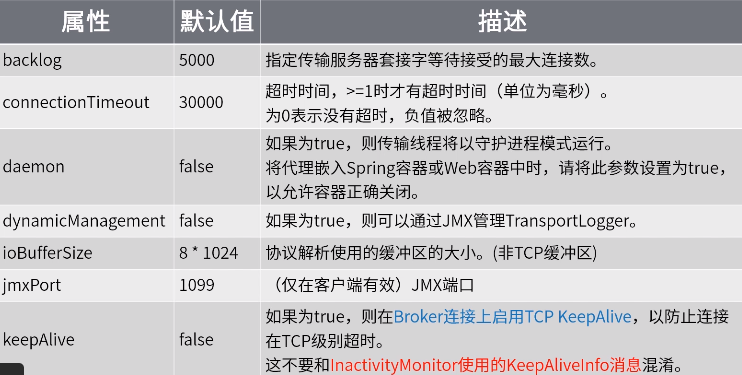
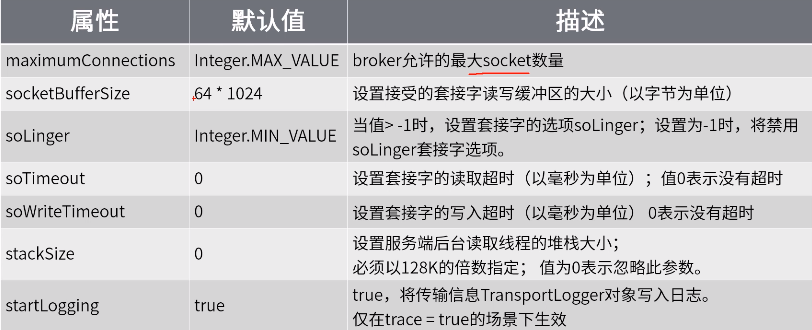
SSL
对外开放
需要一个安全连接的时候可以考虑使用SSL,适用于client和broke在公网的情况,如使用aws云平台等
http://activemq.apache.org/ssl-transport-reference.html
SSL配置格式,可配置参数和TCP相同
ssl://localhost:61616
SSL客户端配置
JMS客户端需要使用ActiveMQSslConnectionFactory类创建连接,brokeUrl以ssl://开头,以下是Spring配置示例
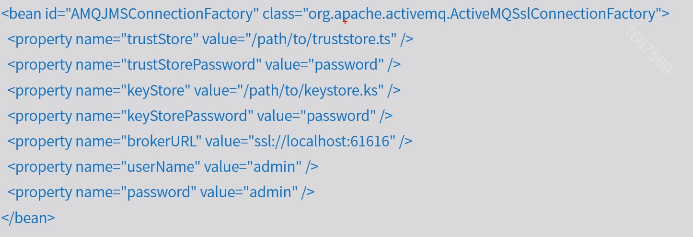
NIO
使用Java的NIO方式对连接进行改进,因为NIO使用线程池,可以复用线程,所以可以用更少的线程维持更多的连接。如果有大量的客户端,或者性能瓶颈在网络传输上,可以考虑使用NIO的连接方式。
NIO配置格式,可配置参数和TCP相同
nio://hostname:port?key=value
Nio是OpenWrite协议的传输方式,其他协议,像AMQP、MQTT、Stomp,也有NIO的实现,通常在协议前缀中加“+nio”来区分。示例:

NIO传输线程使用情况配置
从5.15.0开始,ActiveMQ支持调整NIO的传输线程,可以设置以下属性
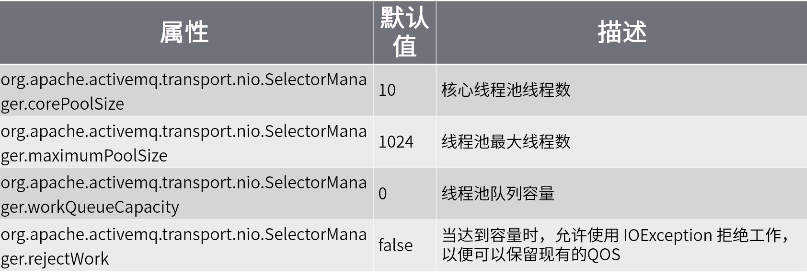
NIO传输线程使用情况配置
属性可以在${ACTIVEMQ_HOME}/bin/env中配置,示例:

NIO SSL
从5.6版开始,NIO可以支持和SSL搭配使用的传输连接。
NIO+SSL配置格式,可配置参数和TCP相同

UDP
与面向连接,可靠的字节流服务的TCP不同,UDP是一个面向数据的简单传输连接,没有TCP的三次握手,所以性能大大强于TCP,但是是以牺牲可靠性为前提。适用于丢失也无所谓的消息。
UDP配置格式

UDP配置参数说明

HTTP(S)
需要穿越防火墙,可以考虑使用HTTP(S),但由于HTTP(S)是短连接,每次创建连接的成本较高,所以性能最差。通过XML传输数据。
HTTP配置格式

HTTPS配置格式

VM
虚拟机协议(方法直调),使用场景是client和broker在同一个Java虚拟机内嵌的情况,无需网络通信的开销。
VM配置格式

VM配置参数说明

3.OpenWire协议
OpenWire是Apache的一种跨语言的协议,允许从不同的语言和平台访问ActiveMQ,是ActiveMQ 4.x以后的版本默认的传输协议。

OpenWire支持TCP、SSL、NIO、UDP、VM等传输方式,直接配置这些连接,就是使用的OpenWire协议,OpenWire有自己的配置参数,客户端和服务器端配置的参数名都通过前缀“wireFormat.”表示。

示例:

配置参数


配置activemq
[root@node01 activemq]# cd /var/activemq/conf [root@node01 conf]# ls activemq.xml client.ts jetty-realm.properties logging.properties broker.ks credentials-enc.properties jetty.xml login.config broker-localhost.cert credentials.properties jmx.access users.properties broker.ts groups.properties jmx.password client.ks java.security log4j.properties [root@node01 conf]# vi activemq.xml
比如,加个日志输出
<transportConnectors>
112 <!-- DOS protection, limit concurrent connections to 1000 and frame size to 100MB -->
113 <transportConnector name="openwire" uri="tcp://0.0.0.0:61616?maximumConnections=1000&wireFormat.maxFrameSi ze=104857600"/>
114 <transportConnector name="amqp" uri="amqp://0.0.0.0:5672?maximumConnections=1000&wireFormat.maxFrameSize=1 04857600"/>
115 <transportConnector name="stomp" uri="stomp://0.0.0.0:61613?maximumConnections=1000&wireFormat.maxFrameSiz e=104857600"/>
116 <transportConnector name="mqtt" uri="mqtt://0.0.0.0:1883?maximumConnections=1000&wireFormat.maxFrameSize=1 04857600"/>
117 <transportConnector name="ws" uri="ws://0.0.0.0:61614?maximumConnections=1000&wireFormat.maxFrameSize=1048 57600"/>
118 </transportConnectors>
默认启动的端口,支持不同的协议,需要什么就开什么
在tcp加参数
<transportConnector name="openwire" uri="tcp://0.0.0.0:61616?transport.trace=true&maximumConnections=1000&wireFormat.maxFrameSi ze=104857600"/>
修改日志文件的格式
vi log4j.properties
加一行日志输出的日志级别
35 # Or for more fine grained debug logging uncomment one of these 36 #log4j.logger.org.apache.activemq=DEBUG 37 #log4j.logger.org.apache.camel=DEBUG 38 log4j.logger.org.apache.activemq.transport.TransportLogger=DEBUG
启动activemq
日志在data目录,进入该目录,查看日志文件内容
tail -f activemq.log
运行producer
UDP
// UDP示例 http://activemq.apache.org/udp-transport-reference.html public class ConsumerAndProducerUDP { public static void main(String[] args) { ActiveMQConnectionFactory connectionFactory = null; Connection conn = null; Session session = null; MessageConsumer consumer = null; try { // 1、创建连接工厂 connectionFactory = new ActiveMQConnectionFactory("udp://activemq.tony.com:61616"); // 2、创建连接对象 conn = connectionFactory.createConnection("admin", "admin"); conn.start(); session = conn.createSession(false, Session.AUTO_ACKNOWLEDGE); // 4、创建点对点接收的目标 Destination destination = session.createQueue("queue1"); // 5、创建生产者消息 MessageProducer producer = session.createProducer(destination); // 设置生产者的模式,有两种可选 // DeliveryMode.PERSISTENT 当activemq关闭的时候,队列数据将会被保存 // DeliveryMode.NON_PERSISTENT 当activemq关闭的时候,队列里面的数据将会被清空 producer.setDeliveryMode(DeliveryMode.NON_PERSISTENT); // 6、创建一条消息 String text = "Hello world!"; TextMessage message = session.createTextMessage(text); // 7、发送消息 producer.send(message); // 8、创建消费者消息 consumer = session.createConsumer(destination); // 9、接收消息 Message consumerMessage = consumer.receive(); if (consumerMessage instanceof TextMessage) { System.out.println("收到文本消息:" + ((TextMessage) consumerMessage).getText()); } else { System.out.println(consumerMessage); } } catch (JMSException e) { e.printStackTrace(); } finally { if (consumer != null) { try { consumer.close(); } catch (JMSException e) { e.printStackTrace(); } } if (session != null) { try { session.close(); } catch (JMSException e1) { e1.printStackTrace(); } } if (conn != null) { try { conn.close(); } catch (JMSException e1) { e1.printStackTrace(); } } } } }
SSL
// ssl客户端: http://activemq.apache.org/ssl-transport-reference.html // http://activemq.apache.org/how-do-i-use-ssl.html public class ConsumerAndProducerSSL { public static void main(String[] args) { // ssl ActiveMQSslConnectionFactory connectionFactory = null; Connection conn = null; Session session = null; MessageConsumer consumer = null; try { // 1、创建连接工厂 connectionFactory = new ActiveMQSslConnectionFactory("ssl://activemq.tony.com:61617?socket.verifyHostName=false"); connectionFactory.setTrustStore("activemq-client.ts"); connectionFactory.setTrustStorePassword("netease"); // 2、创建连接对象 conn = connectionFactory.createConnection(); conn.start(); // 3、 创建session session = conn.createSession(false, Session.AUTO_ACKNOWLEDGE); // 4、创建点对点接收的目标 Destination destination = session.createQueue("queue1"); // 5、创建生产者消息 MessageProducer producer = session.createProducer(destination); // 设置生产者的模式,有两种可选 producer.setDeliveryMode(DeliveryMode.NON_PERSISTENT); // 6、创建一条消息 String text = "Hello world!"; TextMessage message = session.createTextMessage(text); // 7、发送消息 producer.send(message); // 8、创建消费者消息 consumer = session.createConsumer(destination); // 9、接收消息 Message consumerMessage = consumer.receive(); if (consumerMessage instanceof TextMessage) { System.out.println("收到文本消息:" + ((TextMessage) consumerMessage).getText()); } else { System.out.println(consumerMessage); } consumer.close(); session.close(); conn.close(); } catch (Exception e) { e.printStackTrace(); } } }
4.MQTT协议


发布订阅模型
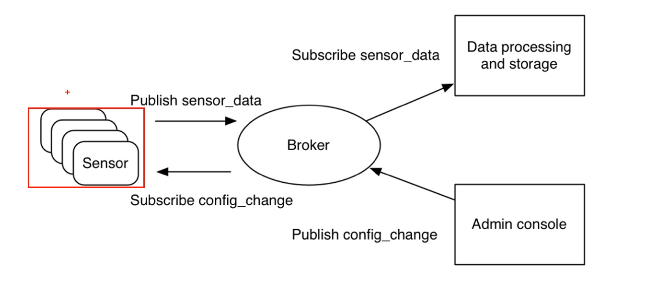
服务质量


怎样工作--QoS level 0

QoS level 1


QoS level 2
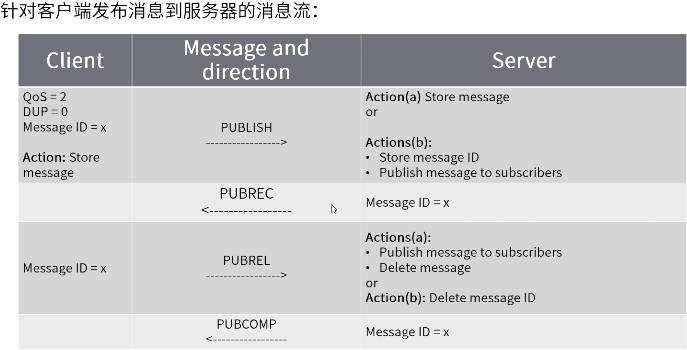
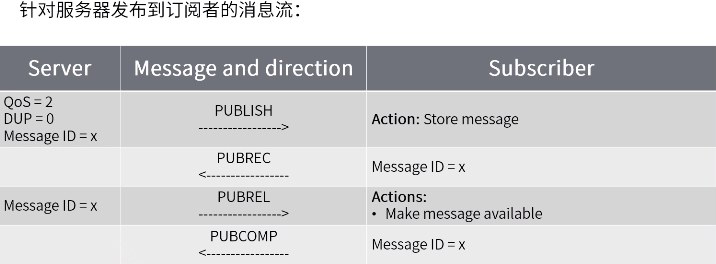
ActiveMQ中使用MQTT协议

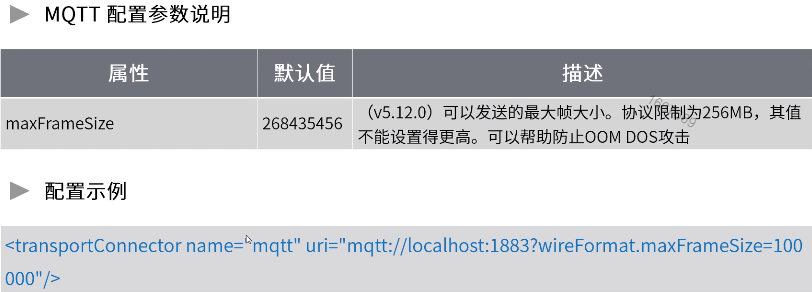

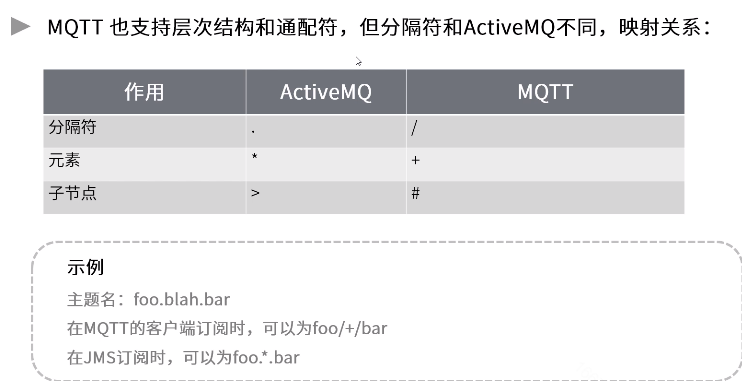
Spring使用MQTT
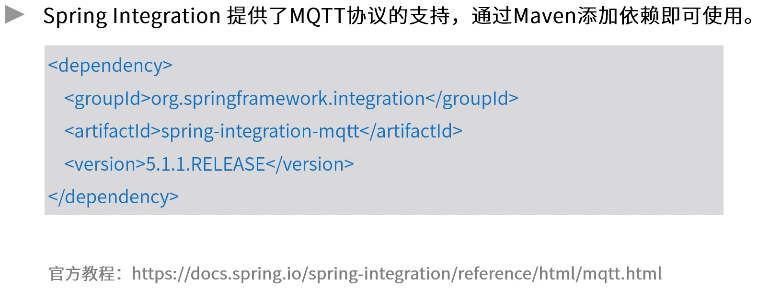
public class MqttConsumer { private static int qos = 2; private static String broker = "tcp://192.168.99.151:1883"; private static String userName = "admin"; private static String passWord = "admin"; private static MqttClient connect(String clientId) throws MqttException { MemoryPersistence persistence = new MemoryPersistence(); MqttConnectOptions connOpts = new MqttConnectOptions(); connOpts.setCleanSession(false); connOpts.setUserName(userName); connOpts.setPassword(passWord.toCharArray()); connOpts.setConnectionTimeout(10); connOpts.setKeepAliveInterval(20); MqttClient mqttClient = new MqttClient(broker, clientId, persistence); mqttClient.connect(connOpts); return mqttClient; } public static void sub(MqttClient mqttClient, String topic) throws MqttException { int[] Qos = {qos}; String[] topics = {topic}; mqttClient.subscribe(topics, Qos, new IMqttMessageListener[]{(s, mqttMessage) -> { System.out.println("收到新消息" + s + " > " + mqttMessage.toString()); }}); } private static void runsub(String clientId, String topic) throws MqttException { MqttClient mqttClient = connect(clientId); if (mqttClient != null) { sub(mqttClient, topic); } } public static void main(String[] args) throws MqttException { runsub("consumer-client-id-1", "x/y/z"); } }
public class MqttProducer { private static int qos = 1; private static String broker = "tcp://192.168.99.151:1883"; private static String userName = "admin"; private static String passWord = "admin"; private static MqttClient connect(String clientId, String userName, String password) throws MqttException { MemoryPersistence persistence = new MemoryPersistence(); MqttConnectOptions connOpts = new MqttConnectOptions(); connOpts.setCleanSession(true); connOpts.setUserName(userName); connOpts.setPassword(password.toCharArray()); connOpts.setConnectionTimeout(10); connOpts.setKeepAliveInterval(20); // String[] uris = {"tcp://10.100.124.206:1883","tcp://10.100.124.207:1883"}; // connOpts.setServerURIs(uris); //这个是mqtt客户端实现的负载均衡和容错 MqttClient mqttClient = new MqttClient(broker, clientId, persistence); mqttClient.setCallback(new PushCallback("test")); mqttClient.connect(connOpts); return mqttClient; } private static void pub(MqttClient sampleClient, String msg, String topic) throws Exception { MqttMessage message = new MqttMessage(msg.getBytes()); message.setQos(qos); message.setRetained(false); sampleClient.publish(topic, message); } private static void publish(String str, String clientId, String topic) throws Exception { MqttClient mqttClient = connect(clientId, userName, passWord); if (mqttClient != null) { pub(mqttClient, str, topic); System.out.println("pub-->" + str); } if (mqttClient != null) { mqttClient.disconnect(); } } public static void main(String[] args) throws Exception { publish("message content", "producer-client-id-0", "x/y/z"); } } class PushCallback implements MqttCallback { private String threadId; public PushCallback(String threadId) { this.threadId = threadId; } public void connectionLost(Throwable cause) { cause.printStackTrace(); } public void deliveryComplete(IMqttDeliveryToken token) { System.out.println("服务器是否正确接收---------" + token.isComplete()); } public void messageArrived(String topic, MqttMessage message) throws Exception { String msg = new String(message.getPayload()); System.out.println(threadId + " " + msg); } }
spring
@SpringBootApplication public class MqttApplication { private static final Log LOGGER = LogFactory.getLog(MqttApplication.class); public static void main(final String... args) { // https://spring.io/projects/spring-integration // https://github.com/spring-projects/spring-integration-samples/ SpringApplication.run(MqttApplication.class, args); } @Bean public MqttPahoClientFactory mqttClientFactory() { DefaultMqttPahoClientFactory factory = new DefaultMqttPahoClientFactory(); MqttConnectOptions options = new MqttConnectOptions(); options.setServerURIs(new String[]{"tcp://192.168.99.151:1883"}); options.setUserName("admin"); options.setPassword("admin".toCharArray()); factory.setConnectionOptions(options); return factory; } // publisher @Bean public IntegrationFlow mqttOutFlow() { // IntegrationFlows.from 数据来源,可以设定为每秒去取数据 return IntegrationFlows.from(() -> "hello mqtt", new Consumer<SourcePollingChannelAdapterSpec>() { @Override public void accept(SourcePollingChannelAdapterSpec sourcePollingChannelAdapterSpec) { sourcePollingChannelAdapterSpec.poller(Pollers.fixedDelay(1000)); } }) .transform(p -> p + " sent to MQTT") .handle(mqttOutbound()) .get(); } @Bean public MessageHandler mqttOutbound() { // 创建handller MqttPahoMessageHandler messageHandler = new MqttPahoMessageHandler("client-si-producer-0", mqttClientFactory()); messageHandler.setAsync(true); messageHandler.setDefaultTopic("x/y/z"); return messageHandler; } // consumer @Bean public IntegrationFlow mqttInFlow() { return IntegrationFlows.from(mqttInbound()) .transform(p -> p + ", received from MQTT") .handle(printHandler()) .get(); } private MessageHandler printHandler() { return new MessageHandler() { @Override public void handleMessage(Message<?> message) throws MessagingException { System.out.println(message.getPayload().toString()); } }; } @Bean public MessageProducerSupport mqttInbound() { MqttPahoMessageDrivenChannelAdapter adapter = new MqttPahoMessageDrivenChannelAdapter("client-si-consumer-1", mqttClientFactory(), "x/y/z"); adapter.setCompletionTimeout(5000); adapter.setConverter(new DefaultPahoMessageConverter()); adapter.setQos(1); return adapter; } }
TCP等是数据传输的方式,基于这种连接方式可以传递什么数据内容,消息协议
5.AUTO协议

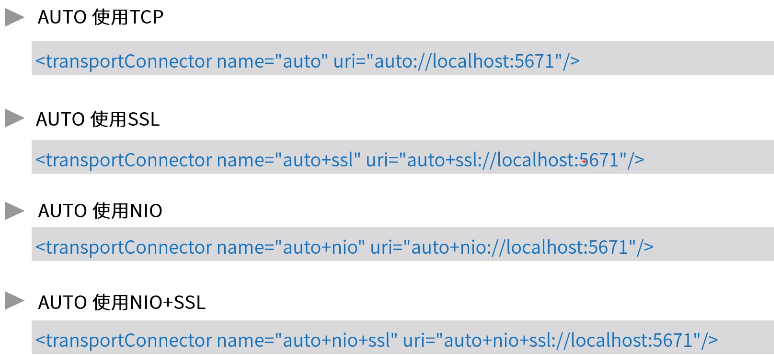
三、高可用集群方案
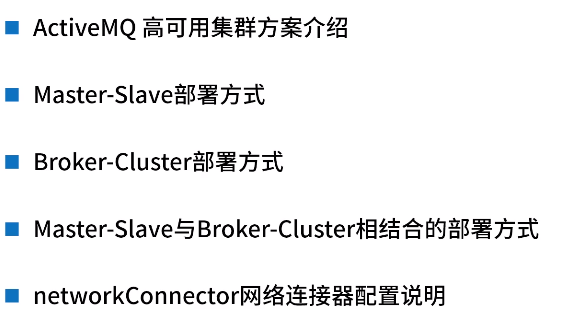
需求:延时调用
配置
37 <!-- 38 The <broker> element is used to configure the ActiveMQ broker. 39 --> 40 <broker xmlns="http://activemq.apache.org/schema/core" brokerName="localhost" dataDirectory="${activemq.data}" schedul erSupport="true">
// 延时、调度消息 http://activemq.apache.org/delay-and-schedule-message-delivery.html // 定时发送邮件通知,或者触发代码执行 public class DelayScheduleMessageDemo { public static void main(String[] args) { new ProducerThread("tcp://192.168.99.151:61616", "queue1").start(); } static class ProducerThread extends Thread { String brokerUrl; String destinationUrl; public ProducerThread(String brokerUrl, String destinationUrl) { this.brokerUrl = brokerUrl; this.destinationUrl = destinationUrl; } @Override public void run() { ActiveMQConnectionFactory connectionFactory; Connection conn; Session session; try { // 1、创建连接工厂 connectionFactory = new ActiveMQConnectionFactory(brokerUrl); // 2、创建连接对象md conn = connectionFactory.createConnection(); conn.start(); // 3、创建会话 session = conn.createSession(false, Session.AUTO_ACKNOWLEDGE); // 4、创建点对点发送的目标 Destination destination = session.createQueue(destinationUrl); // 5、创建生产者消息 MessageProducer producer = session.createProducer(destination); // 设置生产者的模式,有两种可选 持久化 / 不持久化 producer.setDeliveryMode(DeliveryMode.PERSISTENT); // 6、示例消息 // 延时 5秒 TextMessage message = session.createTextMessage("Hello world - 1!"); message.setLongProperty(ScheduledMessage.AMQ_SCHEDULED_DELAY, 5 * 1000L); // 延时 5秒,投递3次,间隔10秒 (投递次数=重复次数+默认的一次) TextMessage message2 = session.createTextMessage("Hello world - 2!"); message2.setLongProperty(ScheduledMessage.AMQ_SCHEDULED_DELAY, 5 * 1000L); // 延时 message2.setLongProperty(ScheduledMessage.AMQ_SCHEDULED_PERIOD, 2 * 1000L); // 投递间隔 message2.setIntProperty(ScheduledMessage.AMQ_SCHEDULED_REPEAT, 2); // 重复次数 // CRON 表达式的方式 以及 和上面参数的组合 TextMessage message3 = session.createTextMessage("Hello world - 3!"); message3.setStringProperty(ScheduledMessage.AMQ_SCHEDULED_CRON, "0 * * * *"); // 7、发送消息 producer.send(message); producer.send(message2); producer.send(message3); // 8、 关闭连接 session.close(); conn.close(); } catch (JMSException e) { e.printStackTrace(); } } } }
延时调用需要高可用,否则崩了,就无法接收到消息
1.方案介绍

2.Master-Slave部属方式
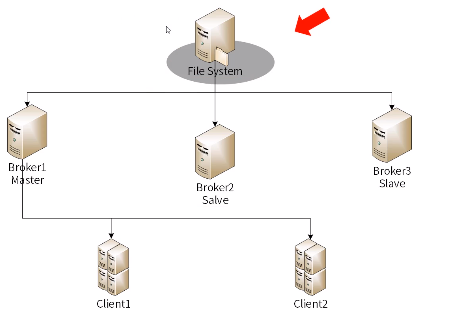
shared database Master-Slave方式
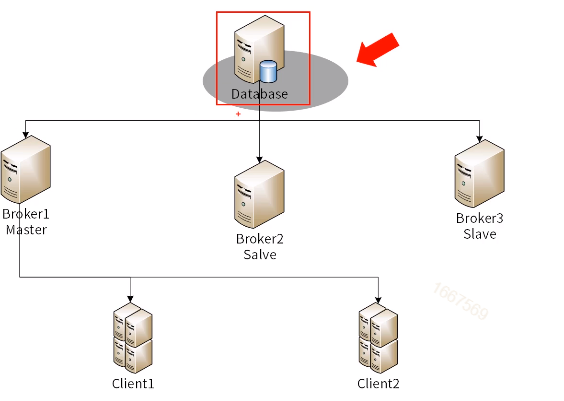
默认不支持数据库,需要在lib/extra目录下放驱动包
修改配置conf/activemq.xml
37 <!-- 38 The <broker> element is used to configure the ActiveMQ broker. 39 --> 40 <broker xmlns="http://activemq.apache.org/schema/core" brokerName="localhost" persistent="true" dataDirectory="${activemq.data}" sched ulerSupport="true">
74 <!-- 75 Configure message persistence for the broker. The default persistence 76 mechanism is the KahaDB store (identified by the kahaDB tag). 77 For more information, see: 78 79 http://activemq.apache.org/persistence.html 80 --> 81 <persistenceAdapter> 82 <kahaDB directory="${activemq.data}/kahadb"/> 83 </persistenceAdapter> 84 <persistenceAdapter> 85 <jdbcPersistenceAdapter dataSource="#mysql-ds" useDatabaseLock="false" transactionIsolation="4"/> 86 </persistenceAdapter>
数据源
<!-- MySql DataSource Sample Setup --> <bean id="mysql-ds" class="org.apache.commons.dbcp2.BasicDataSource" destroy-method="close"> <property name="driverClassName" value="com.mysql.jdbc.Driver"/> <property name="url" value="jdbc:mysql://node03:3306/test_activemq?relaxAutoCommit=true"/> <property name="username" value="root"/> <property name="password" value="mysql_abc123"/> <property name="poolPreparedStatements" value="true"/> </bean>
node03上的mysql要创建text_activemq数据库
重启activemq
集群中的服务器共用mysql服务器,使用同一个mysql实例
只有一个broker抢到
mysql实例中有Lock表
集群配置
只要把activemq目录复制到其他节点,并启动即可
[root@node01 var]# scp -r activemq/ root@node02:/var
启动activemq
Java代码 支持故障切换
// http://activemq.apache.org/failover-transport-reference.html public class ConsumerFailover { public static void main(String[] args) throws InterruptedException { // 非failover的公共参数配置通过nested.*,例如 failover:(...)?nested.wireFormat.maxInactivityDuration=1000 // ?randomize=false 随机选择,默认是顺序 // 指定优先切换 failover:(tcp://host1:61616,tcp://host2:61616,tcp://host3:61616)?priorityBackup=true&priorityURIs=tcp://local1:61616,tcp://local2:61616 // maxReconnectDelay重连的最大间隔时间(毫秒) String brokerUrl = "failover:(tcp://node01:61616,tcp://node02:61616)?initialReconnectDelay=100"; ConsumerThread queue1 = new ConsumerThread(brokerUrl, "queue1"); queue1.start(); queue1.join(); } } class ConsumerThread extends Thread { String brokerUrl; String destinationUrl; public ConsumerThread(String brokerUrl, String destinationUrl) { this.brokerUrl = brokerUrl; this.destinationUrl = destinationUrl; } @Override public void run() { ActiveMQConnectionFactory connectionFactory; Connection conn; Session session; MessageConsumer consumer; try { // brokerURL http://activemq.apache.org/connection-configuration-uri.html // 1、创建连接工厂 connectionFactory = new ActiveMQConnectionFactory(this.brokerUrl); // 2、创建连接对象 conn = connectionFactory.createConnection(); conn.start(); // 一定要启动 // 3、创建会话(可以创建一个或者多个session) session = conn.createSession(false, Session.AUTO_ACKNOWLEDGE); // 4、创建点对点接收的目标,queue - 点对点 Destination destination = session.createQueue(destinationUrl); // 5、创建消费者消息 http://activemq.apache.org/destination-options.html consumer = session.createConsumer(destination); // 6、接收消息 consumer.setMessageListener(message -> { try { if (message instanceof TextMessage) { System.out.println("收到文本消息:" + ((TextMessage) message).getText()); } else { System.out.println(message); } } catch (JMSException e) { e.printStackTrace(); } }); } catch (JMSException e) { e.printStackTrace(); } } }
/** * 简单生产者 */ public class Producer { public static void main(String[] args) { String brokerUrl = "failover:(tcp://node01:61616,tcp://node02:61616)?initialReconnectDelay=100"; new ProducerThread(brokerUrl, "queue1").start(); } static class ProducerThread extends Thread { String brokerUrl; String destinationUrl; public ProducerThread(String brokerUrl, String destinationUrl) { this.brokerUrl = brokerUrl; this.destinationUrl = destinationUrl; } @Override public void run() { ActiveMQConnectionFactory connectionFactory; Connection conn; Session session; try { // 1、创建连接工厂 connectionFactory = new ActiveMQConnectionFactory(brokerUrl); // 2、创建连接对象md conn = connectionFactory.createConnection(); conn.start(); // 3、创建会话 session = conn.createSession(false, Session.AUTO_ACKNOWLEDGE); // 4、创建点对点发送的目标 Destination destination = session.createQueue(destinationUrl); // 5、创建生产者消息 MessageProducer producer = session.createProducer(destination); // 设置生产者的模式,有两种可选 持久化 / 不持久化 producer.setDeliveryMode(DeliveryMode.PERSISTENT); // 6、创建一条文本消息 String text = "Hello world!"; TextMessage message = session.createTextMessage(text); for (int i = 0; i < 1; i++) { // 7、发送消息 producer.send(message); } // 8、 关闭连接 session.close(); conn.close(); } catch (JMSException e) { e.printStackTrace(); } } } }
关闭master主机node01
自动重连了node02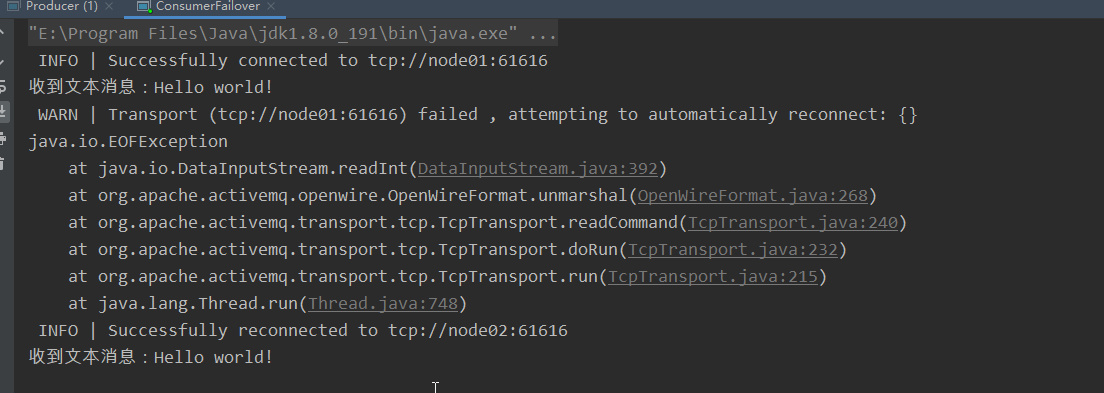
进化版不成功
Replicated LevelDB Store方式 弃用
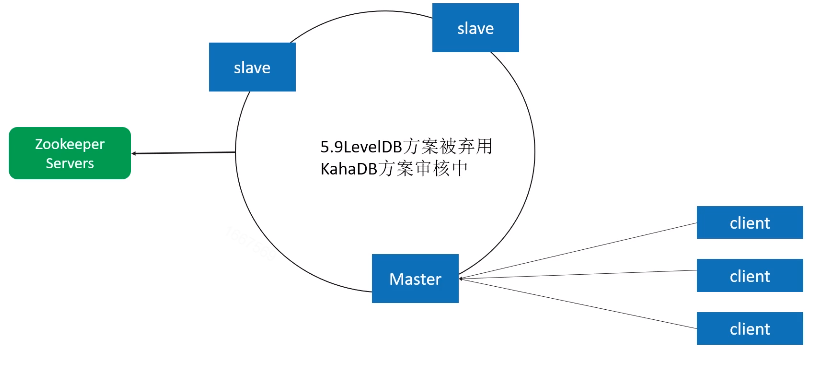
3.Broker-Cluster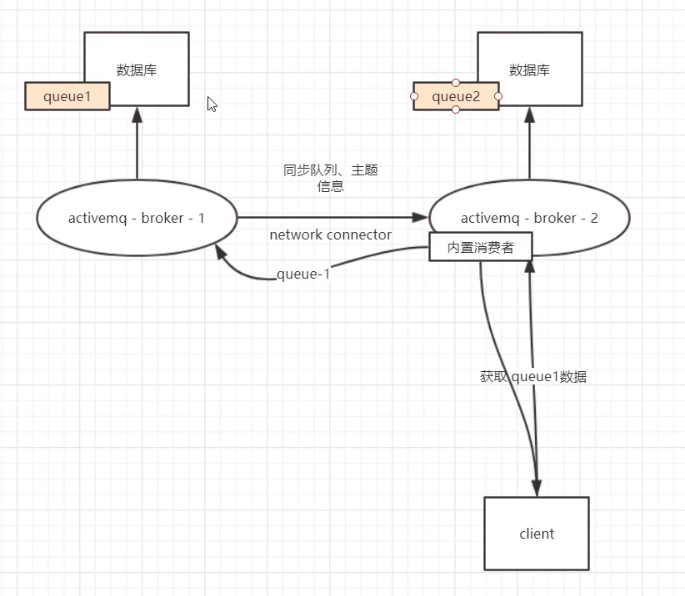
高性能的一种方式,客户端连接任何一台服务器都可以接收信息
比如连broker2,想消费订阅queue1,broker1和borker2之间有network connector,通过内置消费者去borker1里找queue1的数据
内置消费者专门负责消费其他系统的消息,再转发给客户端
还可以加负载均衡机制

去activemq.xml里配置networkConnectors
在node01里
109 <networkConnectors> 110 <networkConnector uri="static:(tcp://node02:61616)"/> 111 </networkConnectors>
在node02里
109 <networkConnectors> 110 <networkConnector uri="static:(tcp://node01:61616)"/> 111 </networkConnectors>
查看web控制台
node01连通node02

还有动态的方式
Broker-Cluster部属方式

Static Broker-Cluster部属配置

Dynamic Broker-Cluster部属配置
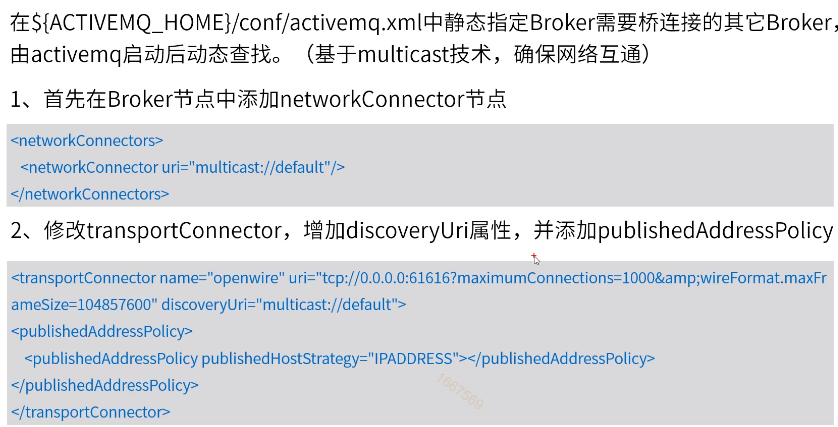
4.Master-Slave与Broker-Cluster相结合的部属方式

5.网络连接器配置说明
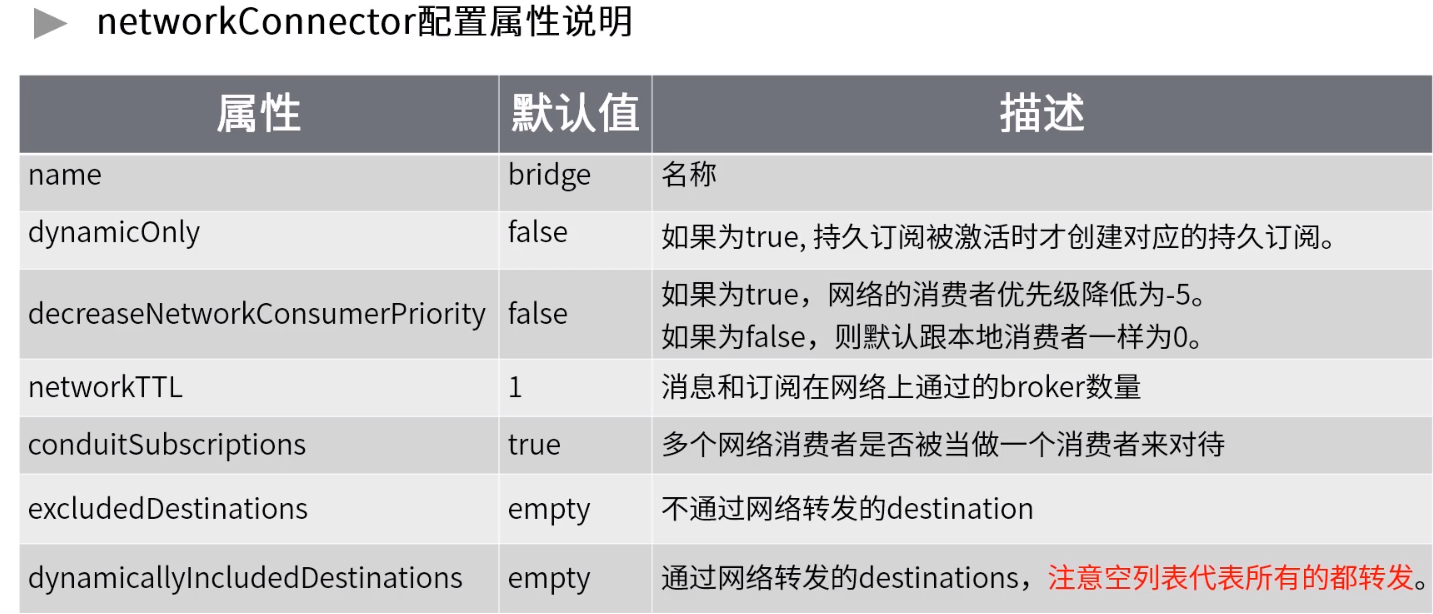
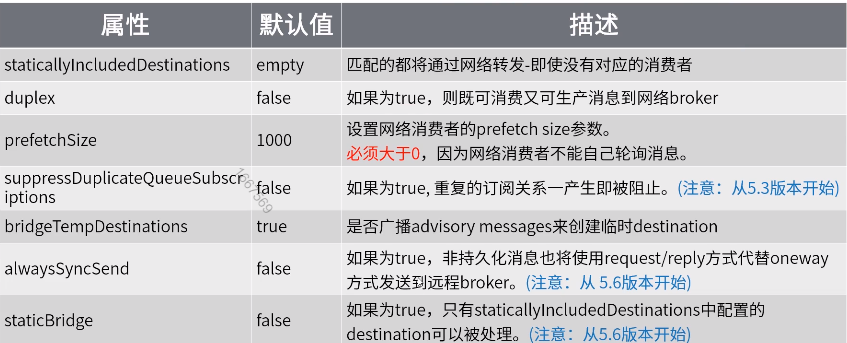
四、持久化原理及事务机制
1.持久化方案

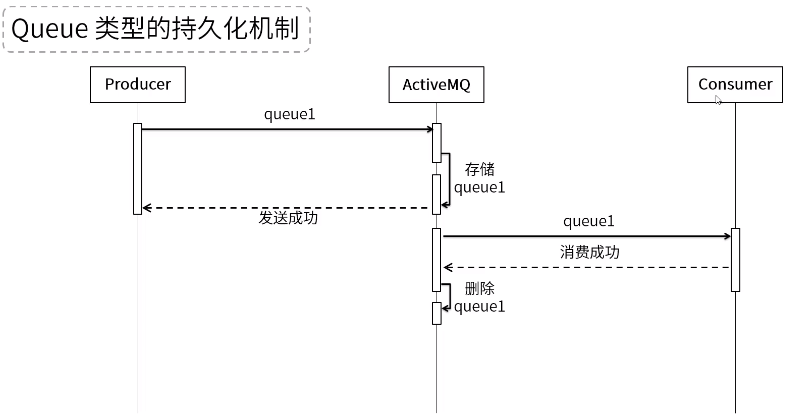
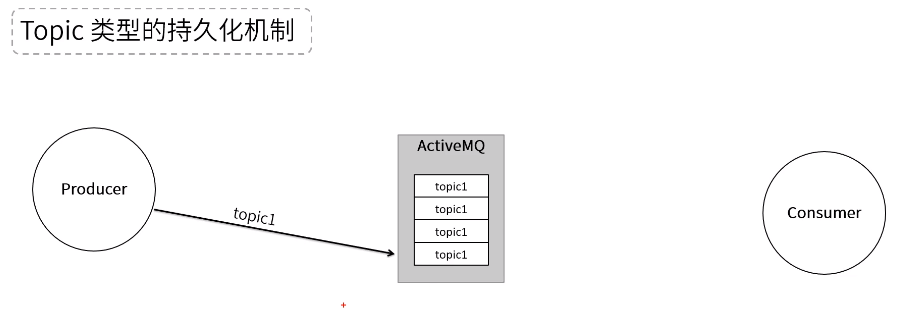
2.JDBC方式

3.AMQ方式

4.KahaDB方式

5.LevelDB

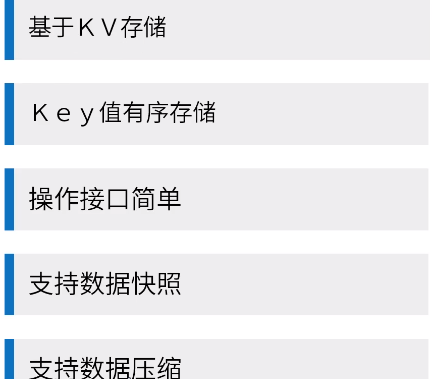
结构
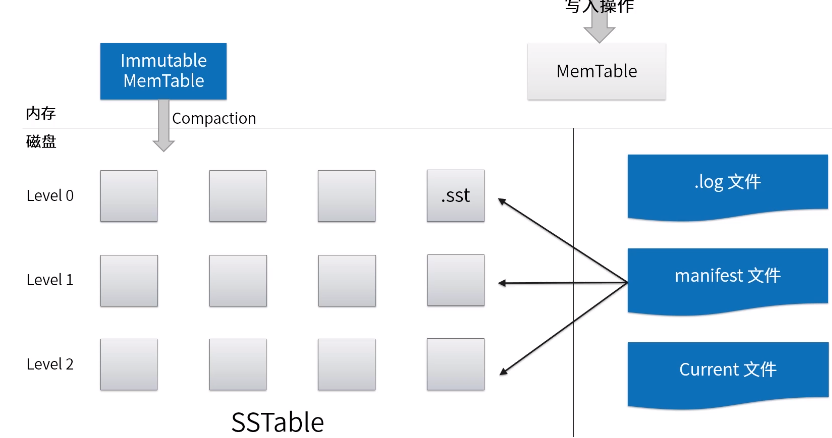
配置

4.事务机制
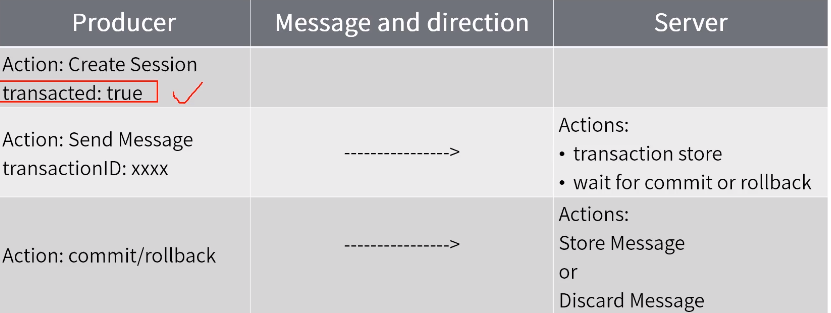
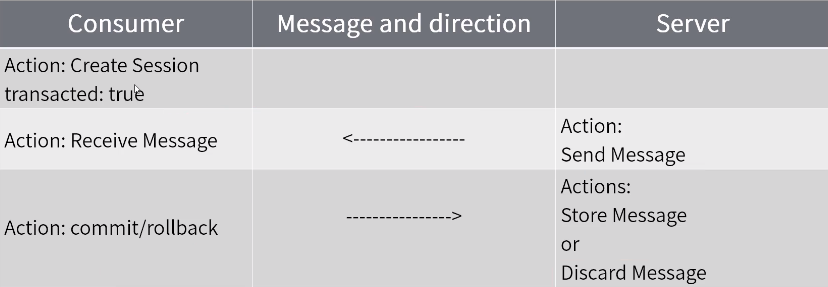
开启事务
